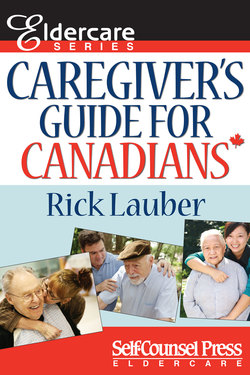Читать книгу Caregiver's Guide for Canadians - Rick Lauber - Страница 8
На сайте Литреса книга снята с продажи.
1. Understanding the Roles of Caregivers
ОглавлениеA caregiver can be simply defined as anyone who formally or informally helps tend to the needs of others — mentally, physically, emotionally, or spiritually.
It’s important to realize that caregivers exist on many different levels. There are the medical doctors who practice full time, the nurses who scurry from hospital room to hospital room, and the volunteers who push patients around in wheelchairs. A caregiver may also work part time and may not even identify himself or herself as someone caring for another. A neighbour could mow the lawn or shovel the walks for a housebound senior, a friend could drop in for a cup of coffee and chat, or a son or daughter could prepare and deliver a home-cooked meal. A minister can provide care and guidance on a spiritual level. A musician can visit a long-term care centre and entertain residents with songs. A small child can provide care by distracting a senior with innocent play. No matter what level a person serves as a caregiver, he or she is doing noble work.
Some caregivers are not even humans! A dog can provide care through unconditional love. Many long-term and acute-care facilities are increasingly offering pet therapy where animals either live in or are brought into the facility for residents. Stroking the fur of a dog or having a cat purr in a person’s lap can be very soothing. Before you bring your pet into your parent’s care facility, clear this with the appropriate authorities. Consider that the sudden excited barking of a dog could upset other residents, and the long hair of a cat could cause unpleasant and potentially dangerous allergic reactions for others.
We often think of parents providing care for their children. This is one of the most obvious examples of caregiving. With Canada’s aging society, we are rethinking that norm and now understand and accept that adult children can so easily become caregivers for their own parents. Caregiving may inch up on you (e.g., a parent’s chronic health condition) or it may happen overnight (e.g., a parent falls and becomes crippled). Should you become a caregiver for both of your parents, it can also happen both ways. You can never totally forecast the future. My father, on the one hand, was always a little forgetful, so Alzheimer’s disease was not a total surprise. My mother’s conditions, on the other hand, came without any warning.
No matter what type of health condition exists (e.g., cancer, multiple sclerosis, kidney disease), caregivers can face a steep learning curve to become more knowledgeable. They will research the condition to become familiar with the symptoms, outcomes, and possible treatments. Sometimes, family caregivers feel shame about having to care for their aging parents. Feared humiliation or a lack of understanding from others can lead to reluctant whispers of admission. This is unfortunate as caregivers should be very proud of their role.
